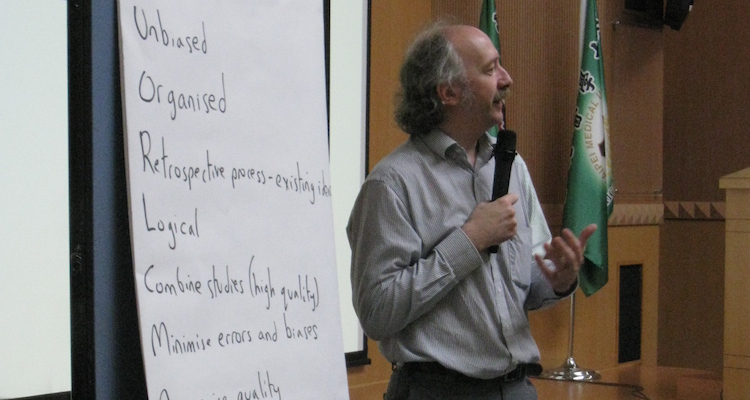Listen Now
If you’re supplying nutritional products into a disaster setting, are you successful because the boxes of food arrived in the villages, or are you successful because the food got into the children’s bellies, or are you successful because the food that got into the children’s bellies made them stronger and fitter?” Professor Mike Clarke is a founder of Evidence Aid and the Director of the Hub for Trials Methodology Research at Queen’s University Belfast in Northern Ireland. For 25 years, Mike has focused his work on rigorous evaluations of the effects of a wide variety of health and social care interventions. He is passionate about improving access to reliable evidence for all decision makers, particularly in resource poor settings. You can connect with Mike here: https://www.ctsu.ox.ac.uk/researchers/professor-mike-clarke
IN TOR 048 YOU’LL LEARN ABOUT:
- Evidence Aid, the platform through which Mike Clarke wants to bring evidence to decision making in the development world, starting with how we respond to disasters.
- The thoughts and development processes that started when Mike watched the 2004 Indian Ocean Tsunami unfold.
- The efforts Evidence Aid and Mike have taken to build the one place where health practitioners and disaster respondents get answers.
- Mike’s ambitious view of Evidence Aid’s reach throughout the many subjects that make up international development, and the current resource challenges they face in order to act on it.
OUR CONVERSATION INCLUDES THE FOLLOWING:
Organizations
- Evidence Aid http://www.evidenceaid.org
- Queen’s University Belfast
Topics
- Evidence based development
- Disaster response
- Health care and practice
- Academic literature bodies of review
- Academic research
- Big data and machine learning
- Post Traumatic Stress Disorder (PTSD)
Places
- Belfast, Northern Ireland
- Indian Ocean
- India
EPISODE CRIB NOTES
Evidence of Aid that works People in disaster, victims or responders, need clear information about what works and what does not. This summarizes Mike’s research. ’04 Indian Ocean Tsunami. What could Mike do, not being a health practitioner? He thought about providing depurated information, but there was no service for it. Good information is about joining varied sources of information. Systematic reviews on specific procedures and courses of action. It revealed that, for instance, 1 hour session of therapy as psychiatric response, immediately after the disaster was not helpful and in fact could be harmful and worsen incidence of PTSD. It informed response event plans in India since then. Mike expects “there will be hundreds of decisions based on evidence. A lot already are“. It’s a big task, about gathering evidence as much as about organizing it. Bodies of review There has been a building effort in the last 20 years. Questions come from all fields: engineering, education, communication. Health was the launching point given the bulk of systematic reviews already existing. Unusual finding turned into actual practice “The research is out there, just a bit untidy. Can we bring it together in one place?“ Probably not exciting research. Reviews gather existing insight encompassing millions of records. “We bring you the definitive answer.“ EA does not just sit expecting people to find them. They reach out to NGOs and organizations. EA raises awareness. It’s looking to do more reviews based on existing needs on the field, a ‘push model.’ The rise of ‘evidence made.’ Also in the future questions of effectiveness and use of resources. Issues of management, organization and strategy “We’re working on a shoestring at the moment.” 1 full time person. Some work part time, some 1 day a week. “We need more people.” Currently talking with potential donors. Mike has a lot of ambitious plans beyond reviews, context and action, all within the ‘push model.’ People on response duties need more than information. EA will push into offering as much as it can. Feasibility, access resources. EA has had approaches with the big data players, to make them better and more useful. Machine learning is valuable but it’s still no match for a human and how they make connections between information, context. At the end only a human can emit final judgement. Research is by nature open ended. “We can look upon thousands of reviews and tell you very definitely: we don’t know the answer.” It does have value, and it can stimulate people to fill in the gaps. But it’s not great for decision making. The website is evolving, becoming more useful, but its improvement depends on the right people to provide good reviews often. “We need feedback from the actual users, health practitioners, disaster responders.” EA needs to become the one place people look for and get answers.Please share, participate and leave feedback below!
If you have any feedback you’d like to share for me or Mike, please leave your thoughts in the comment section below! I read all of them and will definitely take part in the conversation. If you have any questions you’d like to ask me directly, head on over to the Ask Stephen section. Don’t be shy! Every question is important and I answer every single one. And, if you truly enjoyed this episode and want to make sure others know about it, please share it now:[feather_share show=”facebook, twitter, linkedin, google_plus” hide=”reddit, pinterest, tumblr, mail”]
Also, ratings and reviews on iTunes are very helpful. Please take a moment to leave an honest review for The TOR Podcast!




